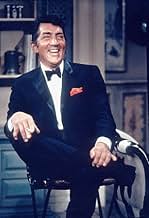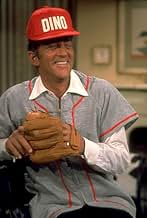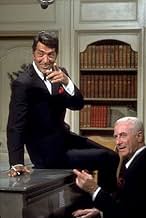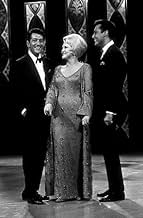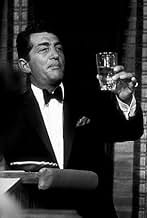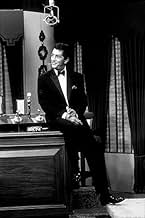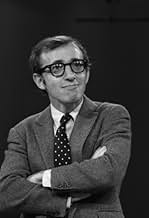NOTE IMDb
8,1/10
1,5 k
MA NOTE
Ajouter une intrigue dans votre langueDean Martin hosts, with several celebrities as guests. There are musical acts and comedy sketches that break down comedy, racial, and sexual barriers all at the same time.Dean Martin hosts, with several celebrities as guests. There are musical acts and comedy sketches that break down comedy, racial, and sexual barriers all at the same time.Dean Martin hosts, with several celebrities as guests. There are musical acts and comedy sketches that break down comedy, racial, and sexual barriers all at the same time.
- Récompensé par 1 Primetime Emmy
- 2 victoires et 22 nominations au total
Parcourir les épisodes
Histoire
Le saviez-vous
- AnecdotesDean Martin wanted to be on TV but also wanted to be free to do movies and records; his contract required that he only show up to do his variety show one day per week (on Sundays). That's why he always seemed slightly out of step with the rest of the cast, who had rehearsed with Lee Hale standing in for Martin the day before. When Martin made a mistake he'd just laugh it off. The audience loved it.
- ConnexionsFeatured in Television Land (1971)
Commentaire à la une
"The Dean Martin Show" was, perhaps, the most thoroughly enjoyable variety series of the sixties, due, in large part, to it's legendary host. Dean Martin refused to take things seriously, on-camera, and his relaxed, flippant attitude seemed to bring out the very best qualities of his guests. Certainly it made his show the 'in' place for virtually every major performer of the era, and while Ed Sullivan might have been able to boast more 'debuts' of up-and-coming stars, where else would you find Orson Welles performing magic, John Wayne and Jimmy Stewart singing, or the Golddiggers bumping and grinding while Martin would sing "All I need is a room somewhere..."
Politically correct? Absolutely not! But at a time of political and social upheaval, a ghastly war, and a nation in turmoil, Martin's show was a 'safe harbor', where the tuxedo-clad host smoked on-camera, joked about his drinking, large family, and inability to read cue cards, and encouraged his viewers to "keep those cards and letters coming in". For a member of the elite 'Rat Pack', Dean Martin seemed eminently accessible, family-friendly (even at his naughtiest), and without malice towards anyone.
Despite the spontaneous 'look', there was a basic structure to "The Dean Martin Show". After the opening bars of "Everybody Loves Somebody", Martin would stumble down a flight of steps (eventually switching to sliding down a fireman's pole), and sing a bouncy pop standard, tell a few jokes, and introduce his guests. Each musical guest did a solo number, then a duet with Dean, each non-singer would chat and do a skit. At the halfway point of the show, Martin would adjourn to his 'music room', peeking into a doorway where an unscheduled guest would make a cameo...he never knew who would be behind the door, and the surprise was a show highlight. Then he'd launch himself onto Ken Lane's piano to knock off a few song parodies, then sing a romantic standard. Each program would finish with a big production number, closing with Martin thanking his guests, and the audience, with a smile.
The formula was irresistible, and Martin, who actually did knock the Beatles' "I Wanna Hold Your Hand" out of Number 1 on the Pop Charts in 1964 with 'Everybody Loves Somebody", was unbelievably popular, nation-wide. Certainly, to everyone who worked with him, he was as laid-back and friendly as his on screen persona (even his ex-partner, Jerry Lewis, called him the most "gifted" performer he ever knew), and NBC, appreciating his contributions, gave him, in 1967, the most lucrative contract an entertainer had ever received from the network, to that time.
When Dean Martin's series finally faded, it was more because of the overall decline of the variety show concept than of any failure on his part; restructuring his show into a comedy 'roast', producer Greg Garrison found a new format that allowed the entertainer several more years as an NBC 'staple'.
While Martin's last years would be haunted by the tragedy of his son's untimely death (Dean Paul Martin, an Air Force pilot, would perish in an airplane crash, in 1987), for nearly two decades, Dean Martin was, undeniably, one of television's greatest stars.
Politically correct? Absolutely not! But at a time of political and social upheaval, a ghastly war, and a nation in turmoil, Martin's show was a 'safe harbor', where the tuxedo-clad host smoked on-camera, joked about his drinking, large family, and inability to read cue cards, and encouraged his viewers to "keep those cards and letters coming in". For a member of the elite 'Rat Pack', Dean Martin seemed eminently accessible, family-friendly (even at his naughtiest), and without malice towards anyone.
Despite the spontaneous 'look', there was a basic structure to "The Dean Martin Show". After the opening bars of "Everybody Loves Somebody", Martin would stumble down a flight of steps (eventually switching to sliding down a fireman's pole), and sing a bouncy pop standard, tell a few jokes, and introduce his guests. Each musical guest did a solo number, then a duet with Dean, each non-singer would chat and do a skit. At the halfway point of the show, Martin would adjourn to his 'music room', peeking into a doorway where an unscheduled guest would make a cameo...he never knew who would be behind the door, and the surprise was a show highlight. Then he'd launch himself onto Ken Lane's piano to knock off a few song parodies, then sing a romantic standard. Each program would finish with a big production number, closing with Martin thanking his guests, and the audience, with a smile.
The formula was irresistible, and Martin, who actually did knock the Beatles' "I Wanna Hold Your Hand" out of Number 1 on the Pop Charts in 1964 with 'Everybody Loves Somebody", was unbelievably popular, nation-wide. Certainly, to everyone who worked with him, he was as laid-back and friendly as his on screen persona (even his ex-partner, Jerry Lewis, called him the most "gifted" performer he ever knew), and NBC, appreciating his contributions, gave him, in 1967, the most lucrative contract an entertainer had ever received from the network, to that time.
When Dean Martin's series finally faded, it was more because of the overall decline of the variety show concept than of any failure on his part; restructuring his show into a comedy 'roast', producer Greg Garrison found a new format that allowed the entertainer several more years as an NBC 'staple'.
While Martin's last years would be haunted by the tragedy of his son's untimely death (Dean Paul Martin, an Air Force pilot, would perish in an airplane crash, in 1987), for nearly two decades, Dean Martin was, undeniably, one of television's greatest stars.
Meilleurs choix
Connectez-vous pour évaluer et suivre la liste de favoris afin de recevoir des recommandations personnalisées
- How many seasons does The Dean Martin Show have?Alimenté par Alexa
Détails
- Date de sortie
- Pays d’origine
- Langue
- Aussi connu sous le nom de
- The Dean Martin Comedy Hour
- Lieux de tournage
- Sociétés de production
- Voir plus de crédits d'entreprise sur IMDbPro
- Couleur
Contribuer à cette page
Suggérer une modification ou ajouter du contenu manquant

Lacune principale
By what name was The Dean Martin Show (1965) officially released in India in English?
Répondre






